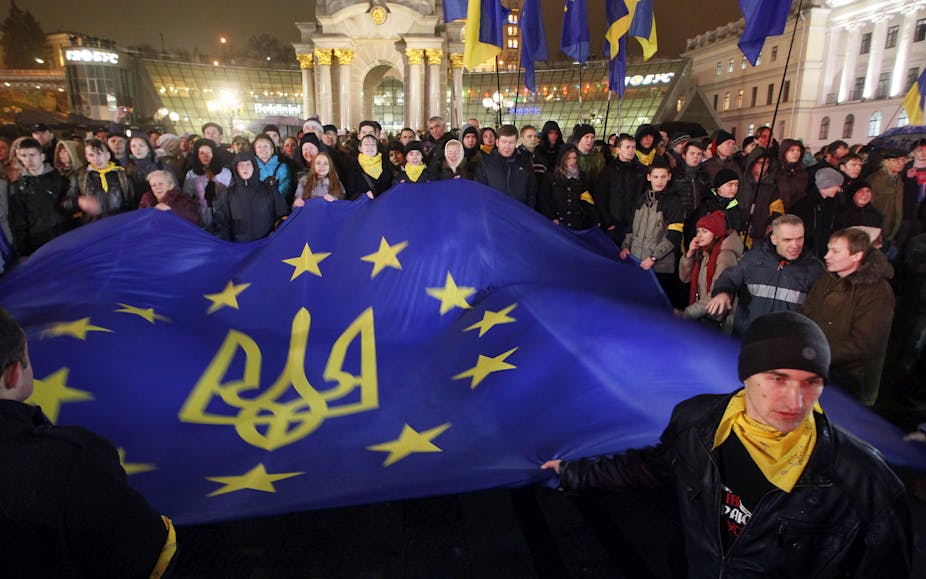For decades, EU-bashing has been a favourite sport among commentators, and carping at the EU’s weak foreign policy performance is especially popular.
More than 20 years ago, British scholar Christopher Hill wrote about the “capability-expectations gap”: lofty statements about the global reach of European unity never quite matched a reality made of watered-down compromises and imaginary “battle groups”. Instead of providing the world with the infamous single telephone number, European capitals were often only able to call the switchboard of the White House.
At first sight, February’s informal European Council Summit focusing on Russia fit right into this picture. At the last stop of a busy week of shuttle diplomacy between Moscow and Munich, European leaders had little more to do than register their approval of the shaky ceasefire agreed in Minsk and reaffirm their commitment to keep pressure on Russia.
The EU’s deep discomfort over what is happening in Ukraine reflects its tacit acceptance that it knows it is powerlessness to change the situation on the ground. The sophisticated political and economic toolkit that Europe relied on to influence events in Eastern Europe until the end of 2013 is woefully inadequate for a crisis like this; policies meant to open up markets or ease people’s mobility across borders are useless in the face of the geopolitical realities imposed from Moscow.
The ever-expanding set of EU sanctions on Russia used to be one instrument in a more comprehensive repertoire of incentives and penalties, but they have become an policy in themselves, with European leaders recurrently emerging from 11th-hour internal negotiations breathing a sigh of relief that the consensus has been renewed.
The verdict on the Minsk agreement offered by German chancellor Angela Merkel – “a glimmer of hope” – may not hold for long. The ceasefire is being breached massively with the predictable coda of recriminations on both sides. Western options seem to keep shrinking.
But Merkel’s verdict does apply. For the first time in a decade, there are signs the Ukraine crisis has inadvertently narrowed the old capability-expectations gap.
All for one
For a long time, Russia was the main source of foreign policy discord inside the EU; over the past decade, Moscow’s belligerent pronouncements would be met by a cacophony of dovish voices from the south clamouring against panicked Russophobes in central Europe. Now, the EU is speaking with one voice against Putin’s excesses as never before.
Federica Mogherini, the new EU foreign policy chief, at first raised doubts because of her inexperience and alleged coziness to Russia. She is proving critics wrong, at least on the first count, by staying on message and sticking to clear priorities – most notably a roadmap towards a new European security strategy.

And whatever one might think of Mogherini’s relative Russophilia, she is counterweighted by the presence of European Council President Donald Tusk, a former Polish prime minister. While his executive powers may be limited, Tusk is emerging as a strong moral authority in dealings with Moscow.
Meanwhile, the story of European foreign policy since Ukraine is also the story of Germany’s coming of age. In a recently released Scorecard of European foreign policy, Germany is estimated to have led EU foreign policy “more than any other member state … and across all world regions”. The days when Germany didn’t even try to lead from behind are basically over, as is the country’s old image as an economic giant but a political pygmy. Thanks to Germany’s economic heft, this transformation is vital if the EU is to play a more assertive role in the world.
Do what you’re good at
To turn a glimmer of hope into a proper foreign policy profile, the EU will have to step up its game on at least two fronts.
During the 2015 Munich security conference, Angela Merkel repeatedly stated that there is no military solution to the Ukrainian crisis, just as there was so military solution to the Cold War. But as other participants argued, military deterrence played a vital role in the events leading up to 1989. In short, a stronger foreign policy will simply require a stronger military component – not least in Germany.
Meanwhile, too much of the EU’s efforts has been a reactive and incoherent Russia policy, not a strategy for dealing with all its eastern neighbours in a constructive and assertive way.
With a bit of direction that can be changed. In Ukraine, Europe should focus on what it does best: helping build institutions, fighting corruption, strengthening governance. This is Europe’s own distinctive way of changing facts on the ground. And in the end, that will also be the foundation of the Russia policy it needs, and which it is finally starting to develop.

